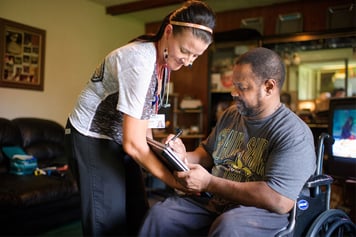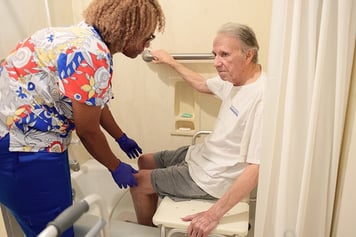Speech therapy is an essential component to the home health model of care. Not only does it benefit patients with difficulty communicating and swallowing and those with poor memory and disorientation, but speech therapy can also reduce falls. In order to do so, speech therapists focus on these three main areas.
Impaired Cognition/Dementia
60 percent of patients with dementia will fall, and 60-80 percent of these patients will fall within a year of their diagnosis. Speech therapists use cognitive retraining, skilled communication tasks and the development of visual and auditory aids that promote improved cognition and safety to reduce these falls.
Hearing Loss
Hearing loss is a major factor in falls, and research shows a link between individuals with untreated hearing loss and an increased risk and incidence of falls. Many things can cause hearing loss, including chronic disease, exposure to loud sounds and family history, to name a few. To determine if patients have hearing loss, speech therapists will ask some of the following questions:
- Do you have difficulty understanding speech?
- Do you hear ringing or noises in your ears and/or head?
- Do you have pain or discomfort in your ear(s)?
- Have you ever had a sudden or rapid progression of hearing loss?
- Do you experience dizziness and/or impaired balance?
- Have you had any recent drainage in your ear(s)?
- Do you have a family history of hearing loss?
Once hearing loss is determined, a speech therapist can provide education that includes visual and auditory aids and reasoning and sequencing tasks that will help improve maintenance and the use of hearing aids.
Nutrition and Hydration
Proper nourishment and hydration alone can reduce the risk of falls. Poor nutrition that results in a reduced appetite can lead to reduced energy, which affects the ability to safely perform daily activities. Poor hydration leads to dizziness, dehydration and hypovolemia and can also increase the risk of falling. For patients with dysphagia, speech therapists diagnose, treat and develop plans for safely improving their hydration and nutrition to reduce their risk.





